Cremation, Caste, and Cosmogony in Karmic Traditions.
Cremation, Caste, and Cosmogony in Karmic Traditions.
Cremation, Caste, and Cosmogony in Karmic Traditions.
Create successful ePaper yourself
Turn your PDF publications into a flip-book with our unique Google optimized e-Paper software.
(seeds, food). In life a person becomes what one eats,<br />
which highlights consumption of food, but also the<br />
defilement from substances bodily disposed off such as<br />
menstrual blood, semen, excreta, <strong>and</strong> death. All bodily<br />
genera are descended from the orig<strong>in</strong>al cosmic Purusa,<br />
<strong>and</strong> “person <strong>and</strong> genera are thus conceived of as<br />
channell<strong>in</strong>g <strong>and</strong> transform<strong>in</strong>g heterogeneous, eveflow<strong>in</strong>g,<br />
chang<strong>in</strong>g substances” (ibid:233).<br />
In order to underst<strong>and</strong> how the transactions of s<strong>in</strong> occur,<br />
a metaphor may illum<strong>in</strong>ate this process: the body is a<br />
“vessel”. This “vessel” metaphor is crucial <strong>in</strong> the<br />
underst<strong>and</strong><strong>in</strong>g of castes as transactions of coded<br />
substances. A pure person that has been defiled by<br />
temporary impurity, basically through consumption of<br />
water or food, has to purify his body (“vessel”) through<br />
subsequent rites. Therefore, all <strong>in</strong>teractions <strong>and</strong><br />
transactions of substances are potentially dangerous<br />
because they may <strong>in</strong>volve defilement of one’s purity.<br />
Each substance has a value, an entity which <strong>in</strong> theory<br />
<strong>and</strong> practice is both morally <strong>and</strong> religiously def<strong>in</strong>ed, <strong>and</strong><br />
society is structured around the different transactions<br />
that are hierarchically regulated through sanctions <strong>and</strong><br />
taboos.<br />
The body as a “vessel”, which each <strong>and</strong> everyone is<br />
concerned about, is therefore fundamental <strong>in</strong> castes<br />
28<br />
perceived as moral substance codes. The Funeral priests<br />
who conduct cremations <strong>and</strong> mourn the dead are called<br />
Mahabrahmans, which literally means the “great<br />
Brahmans”, but this sub-caste of Brahmans are also<br />
knows as Mahapatra, which means “great vessels”<br />
(Parry 1994:76). Their role <strong>in</strong> funerals is to function as<br />
“great vessels”, which are filled with s<strong>in</strong> <strong>and</strong> pollution,<br />
<strong>and</strong> this paradox is the matter of debate regard<strong>in</strong>g the<br />
caste hierarchy <strong>and</strong> the common assumption that<br />
Brahmans are ranked highest because of their purity.<br />
It has been argued that although theories of bodily<br />
substances are highly developed, these notions belong to<br />
the cultural doma<strong>in</strong> of medic<strong>in</strong>e <strong>and</strong> not to an<br />
“ethnosociological” metaphysic of caste identity<br />
(McGilvray 1982b:35), <strong>and</strong> further, that these notions<br />
are hardly articulated <strong>in</strong> hierarchy disputes <strong>and</strong> claims<br />
(ibid:88).<br />
In normal <strong>and</strong> daily social <strong>in</strong>teraction this might be true,<br />
but with<strong>in</strong> the realm of death they are both articulated<br />
<strong>and</strong> disputed. I will therefore emphasise the moral<br />
substance code approach for an underst<strong>and</strong><strong>in</strong>g of castes.<br />
Death is a social sett<strong>in</strong>g for the construction of castes<br />
through the consumption of human flesh either<br />
physically or symbolically, <strong>and</strong> this is the core theme for<br />
the follow<strong>in</strong>g chapters <strong>in</strong> part 1.


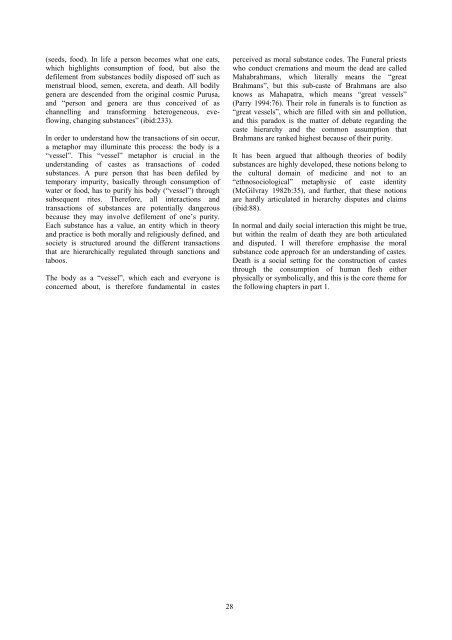
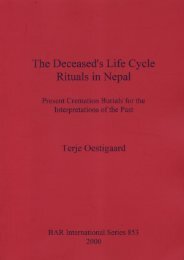


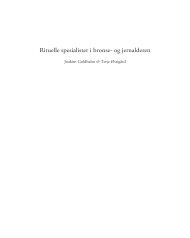
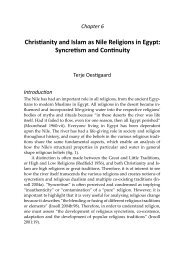
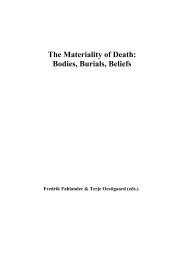


![Fullmono-AK [P2118].indd - oestigaard](https://img.yumpu.com/18994998/1/177x260/fullmono-ak-p2118indd-oestigaard.jpg?quality=85)